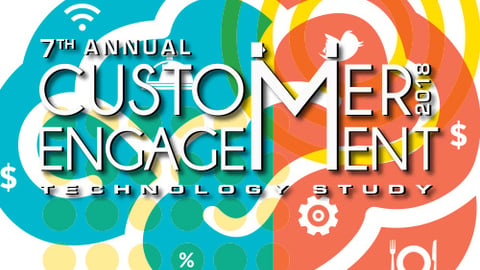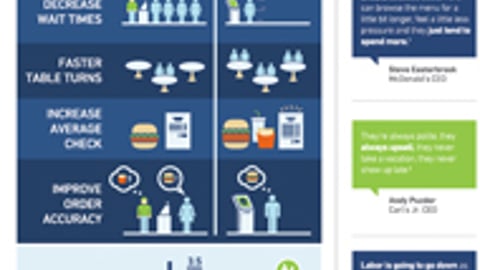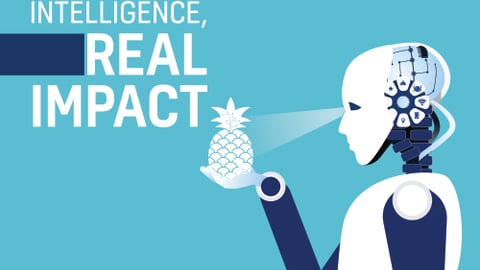How Digital Signage is Reshaping Hospitality
This thought leadership article from Advantech, a provider of embedded and automation products and solutions, details how digital signage, self-serve kiosks and cloud-based technologies have enabled futuristic service automation.
Today, consumers have become accustomed to what's quick and easy, particularly in urban cities throughout America. The desire for convenience in the 21st century has inarguably reached every corner of the globe, with mobile phones that now outnumber the global population a primary example. That same desire for speed and ease has also led to the transformation of nearly every industry, from healthcare to hospitality, where digital signage, self-serve kiosks and cloud-based technologies have enabled futuristic service automation. In addition to providing the quick and convenient ordering and delivery of products and services via ecommerce, these technologies and concepts are increasing organizational efficiency in both staffing and resources while saving consumers' time and reducing overall costs. A recent census from Kiosk Marketplace reveals that the self-serve kiosk industry has never been stronger—thanks in large part to expanding mobile commerce worldwide—with nearly a third of operators surveyed indicating they were already in the process of installing kiosks, while a comparable number anticipated installing kiosks in the next 12 months.
Immersing Consumers in Experiences
Digital signage, too, has taken a quantum leap according to a recent report from Grand View Research, which estimates the global digital signage market will increase to approximately $31 billion by 2025, nearly doubling in size from $16 billion in 2016. Attributing the anticipated growth to a high demand for the digital promotion of services and products, researchers point to the tremendous benefits for advertisers, who can easily access, customize, update and manage the information and content from a remote location at any time from a wide range of devices including video walls, large-screen displays and mobile tablets among others. In fact, digital menu boards are moving into the service industry at rapid speed, with restaurants, retailers and franchises in the automotive, banking, healthcare, entertainment and hospitality industries cashing in on their ability to communicate dynamic messages in real time, as well as entice consumers with more targeted and engaging content imagery—all integrating with mobile and cloud technologies that include metrics and granular data to assist with analyzing, tracking and improving ROI.
Nowhere in the world has technology been so central to the hospitality industry than in Las Vegas where even the smallest of its 104 casinos use advanced technologies to count, entice and monitor guests. In recent years, however, that same technology has been implemented to enable an enhanced experience for visitors. A syndicated article in the San Francisco Chronicle reported on a wide array of hotels that provide conveniences such as tablets for in-room services, smartphone check-in and check-out and touch-screen automated vending machines dispensing everything from currency to cupcakes. More science fiction-like but very real is the Mandarin Oriental's robot Pepper, who can interact with hotel guests just like a human concierge, and the “Brilliant!” exhibition at the Neon Museum, which utilizes another technology—projection mapping—to entertain visitors by re-animating some of the museum’s iconic vintage signs.
Embracing Artificial Intelligence
Automated technologies are far from fun and games, however. In Vegas, and throughout the hospitality industry, it's all about business—the business of speed and convenience. And it will likely evolve to include artificial intelligence, Siri- or Alexa-style, that can predict a user's interests, make suggestions and respond appropriately, whether it is a command to control a room's environment, troubleshoot a utility problem or provide answers to just about any question. Fear that automation will replace jobs in the hospitality industry, however, is a real concern. But while it is taking hold, there will always be room for the human touch. In a McKinsey analysis of 800 occupations in the hospitality industry, research revealed that 73 percent of tasks could be completed using current technology. It also indicated that because customers still value and expect exceptional service from real individuals, automation will eliminate very few occupations entirely in the next decade.
Though likely to impact nearly all jobs to a certain degree, automation has the potential to create new roles, particularly those directly tied to developing and maintaining technology, as well as creating new content, products and services, as long as enterprises understand how digital transformation can help improve their bottom line and offerings. Support from a trusted technology partner is critical not only to help organizations choose the solutions necessary to satisfy customer expectations but also to implement the right features that will enable ease of interaction with the technology, whether on personal devices or public terminals and displays.




